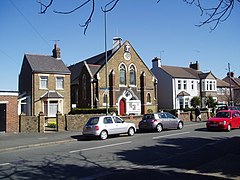Belvedere, Kent
| Belvedere | |
|---|---|
 All Saints Church |
|
 Village streetscene with the Congregational Church |
|
| Belvedere shown within Greater London | |
| Population | 11,890 (2011 Census. Ward) |
| OS grid reference | TQ495785 |
| London borough | |
| Ceremonial county | Greater London |
| Region | |
| Country | England |
| Sovereign state | United Kingdom |
| Post town | BELVEDERE |
| Postcode district | DA17 |
| Dialling code |
020 01322 |
| Police | Metropolitan |
| Fire | London |
| Ambulance | London |
| EU Parliament | London |
| UK Parliament | |
| London Assembly | |
Belvedere /ˈbɛlvədɪər/ is a town in the London Borough of Bexley, in the traditional county of Kent and ceremonial county of Greater London.
The area which is today known as Belvedere was for centuries part of Lesness Heath, the eastern parts of a narrow high ridge which stretches from the area of Lesnes Abbey to Erith. The northern stretch is industrial and environmental and was common meadow. In 1847 this largely uncultivated, wooded estate, almost undivided was given by operation of the will of last Lord Saye and Sele to his cousin Sir Culling Eardley, who built properties in Belvedere until his death in 1863. Eardley constructed a large wooden tower (see Belvedere (structure)) on the heath to gain views over his estate to the river Thames, giving the area its name from the Italian "beautiful view". The name can also be applied today, as the ridge of the area, and parts of its southern uplands, have commanding views towards Canary Wharf and Central London.
Eardley was persuaded to allow the construction on his property, of a Dissenters' chapel, which was built so that the original wooden belvedere became its tower. In order that the public were able to attend this chapel, he constructed paths to it across Lesness Heath. Eardley had finished in 1861, after nearly 8 years of building, his chapel, now All Saints' Church, after the earlier chapel with belvedere burned down on the same site. At the same time Eardley constructed Villa Houses and reinforced the heath path to become Erith Road. The village of Belvedere soon grew up along the path which became Nuxley Road as Eardley gradually sold off the land.
...
Wikipedia

